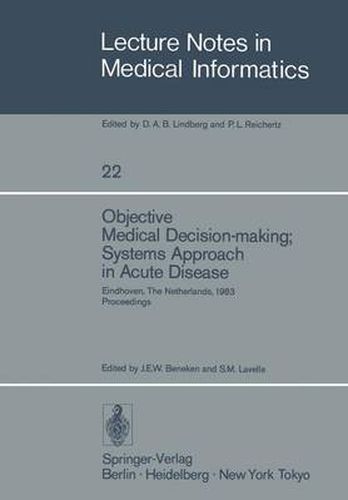Readings Newsletter
Become a Readings Member to make your shopping experience even easier.
Sign in or sign up for free!
You’re not far away from qualifying for FREE standard shipping within Australia
You’ve qualified for FREE standard shipping within Australia
The cart is loading…






This title is printed to order. This book may have been self-published. If so, we cannot guarantee the quality of the content. In the main most books will have gone through the editing process however some may not. We therefore suggest that you be aware of this before ordering this book. If in doubt check either the author or publisher’s details as we are unable to accept any returns unless they are faulty. Please contact us if you have any questions.
Objective medical decision~making has shown itself to be an emerging discipline which is sufficiently robust to promote its further development. This book identifies many important areas for applications in the field of acute patient care. The different approaches require testing, evaluation and mutual co~parisons to ensure that the right method is used to solve the existing problem. Medical sciences and patient care are increasingly supported by system sciences, resulting in growing multi- and interdisciplinary research and development areas. In this context, system sciences involve the methods, techniques, concepts and approaches obtained f~om disciplines such as mathematics, statistics, stochastic signal theory, fuzzy set theory, systems and control theory, signal analysis, pattern recogni tion, simulation, computer languages, structured programming, data base management and computer sciences. This book contains the papers of a workshop Objective Medical Decision making f Systems approach in acute disease which was initia ted and supported by the SWG/COMAC on Biomedical Engineering, Evaluation of Technology, Transfer and Standardization of CRM/CREST of the European Community. In setting up the original programme we have been assisted by a group of experts and for their cooperation we are very gratef.ul to S. Dawids, Copenhagen E. Epple, Tlibingen ; J. Jones, Harrow; L. Lambotte, Brussels C. Marchesi, Pisa and D. Robert, Lyon. The papers have been arranged in four groups, each followed by a brief synopsis. The four groups are : diagnosis, monitoring, therapy and control, and evaluation of criteria and procedures.
$9.00 standard shipping within Australia
FREE standard shipping within Australia for orders over $100.00
Express & International shipping calculated at checkout
This title is printed to order. This book may have been self-published. If so, we cannot guarantee the quality of the content. In the main most books will have gone through the editing process however some may not. We therefore suggest that you be aware of this before ordering this book. If in doubt check either the author or publisher’s details as we are unable to accept any returns unless they are faulty. Please contact us if you have any questions.
Objective medical decision~making has shown itself to be an emerging discipline which is sufficiently robust to promote its further development. This book identifies many important areas for applications in the field of acute patient care. The different approaches require testing, evaluation and mutual co~parisons to ensure that the right method is used to solve the existing problem. Medical sciences and patient care are increasingly supported by system sciences, resulting in growing multi- and interdisciplinary research and development areas. In this context, system sciences involve the methods, techniques, concepts and approaches obtained f~om disciplines such as mathematics, statistics, stochastic signal theory, fuzzy set theory, systems and control theory, signal analysis, pattern recogni tion, simulation, computer languages, structured programming, data base management and computer sciences. This book contains the papers of a workshop Objective Medical Decision making f Systems approach in acute disease which was initia ted and supported by the SWG/COMAC on Biomedical Engineering, Evaluation of Technology, Transfer and Standardization of CRM/CREST of the European Community. In setting up the original programme we have been assisted by a group of experts and for their cooperation we are very gratef.ul to S. Dawids, Copenhagen E. Epple, Tlibingen ; J. Jones, Harrow; L. Lambotte, Brussels C. Marchesi, Pisa and D. Robert, Lyon. The papers have been arranged in four groups, each followed by a brief synopsis. The four groups are : diagnosis, monitoring, therapy and control, and evaluation of criteria and procedures.